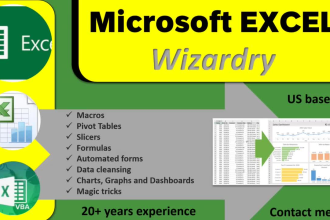Browse categories
Data Processing
Sort through and organize data the best way.
|6,600+ Results
Sort by:

Level 2
I will do excel spreadsheet, excel vba, data entry, excel functions
From $50
Offers video consultations
Level 2
I will do excel vba, macros, automation, ms excel and formulas
From $20
Offers video consultations
Data Processing FAQs
What is Data Processing?
Data processing refers to a stage preceding data analysis and includes data collection and preliminary preparation. Although it may also include a short analysis, the main focus lies on different methods of gathering data that do not originate in your business. Data processing involves the collection of data in a systematic manner or in large quantities. Data processing focuses on data sources and how to get data quickly and without high expenditure.
When should you look for Data Processing services?
Since data processing involves gathering and cleaning data, there are two primary situations in which you need this kind of service. In the first, you may not have any of the data that you need to answer a business question. For instance, if you plan to conduct marketing research but do not possess any competitor or pricing data yet, you will need data processing to collect market data. The second situation is when you have a lot of raw, untidy data that your data analyst cannot easily work with. It may make sense to outsource preliminary data processing when this happens.
Which services are included in Data Processing?
In the first place, data processing services include data collection by means of web scraping, downloading, retrieving through API, or querying a database. Data collection may be a one-time action or a regular routine. The next important step is data cleaning, including formatting, working with outliers and other anomalies, standardization, and normalization, as well as other transformations. After data processing is finished, and upon your agreement with the seller, you can acquire the source code and related documentation of the data processing procedures to use later on your own.
What kinds of information can you process?
Although there are no limits, the data processing services market demonstrates a few tendencies. Most of the time, you need marketing data, such as contact information, prices, and product reviews. Listings and data from stock markets make up another large group of data that are typically acquired through data processing services. The last kind of information has to do with media and encompasses blog content, news articles, and social media. You may notice that most data involved in data processing are publicly available on the internet or through open databases.
Which Data Processing technologies are the most popular?
Data collection can be manual and automated. Automated methods use programming languages, such as Python, Ruby, PHP, Java, Javascript, R, and others. The same languages can be utilized for data cleaning, formatting, and modeling. Alternatively, there are multiple tools that can be used for data processing, ranging from Excel sheets for beginners to more advanced tools such as MATLAB. In most cases, you will need solid storage for your data: good options include those from the AWS family or based on Apache technology. Final results are usually delivered as a spreadsheet in Excel, OpenOffice, or Google.
What kind of expertise should you look for?
Sellers may work with different technologies. Tool-agnostic expertise can be divided into groups depending on your goal or project stage. At the beginning of a project, you need expertise in data extraction, ETL (eject-transform-load), and formatting. SQL and NoSQL languages and API integration are useful here. For the next step, your seller needs to be familiar with data validation and normalization. The final stage may require some clustering and classification techniques. Depending on the tool, a data processing specialist may use formulas, macros, or functions at any of these stages.





















